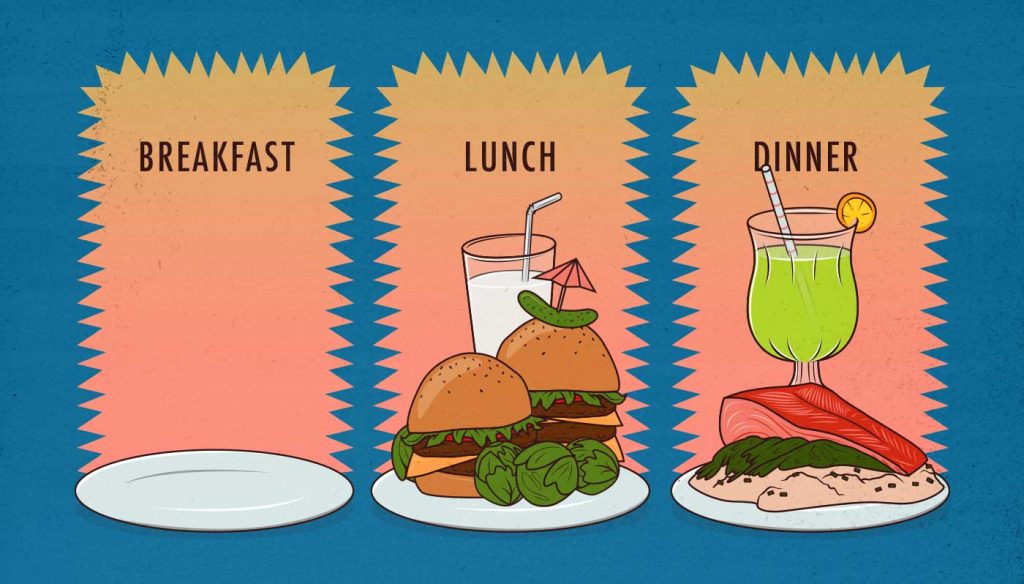
Is Intermittent Fasting Good for Building Muscle?
Intermittent fasting is popular for weight loss. But what if you’re a skinny guy trying to bulk up? Can you use intermittent fasting to build muscle faster or more leanly? After all, intermittent fasting raises growth hormone production, which purportedly helps with muscle growth; it increases insulin sensitivity, which could help make your muscle gains leaner; and research shows that intermittent fasting may help preserve muscle when losing weight.
On the other hand, bodybuilders are known for eating frequently—every few hours. They eat more often than the average person. Why is that? Could there be an advantage to eating more meals more often?
Finally, does intermittent fasting make it harder to eat enough calories to gain weight? Skinny guys are notorious for having smaller stomachs, faster metabolisms, and more meagre appetites, all of which can make it harder to eat enough calories to gain weight. Will intermittent fasting make that even harder?
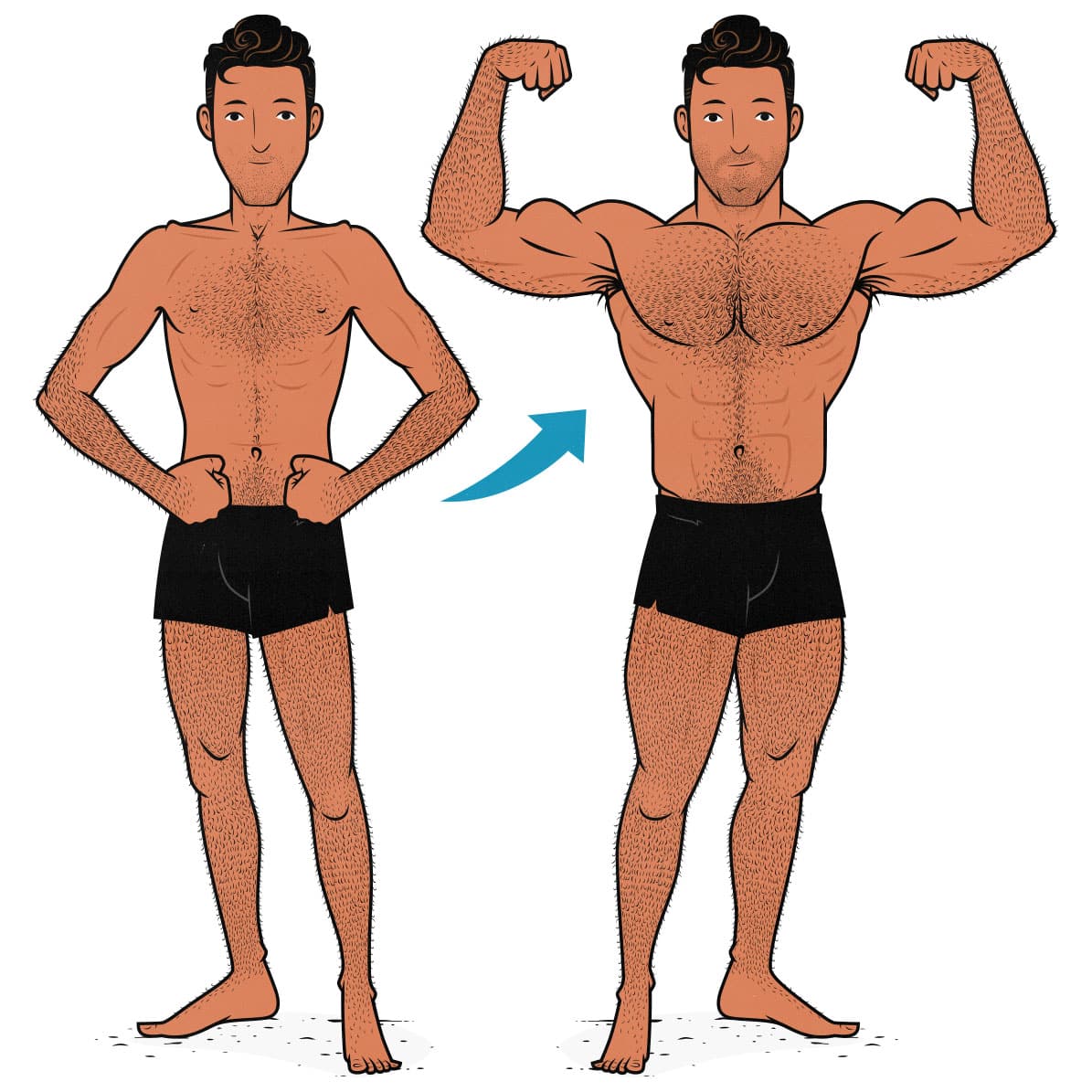
What Is Intermittent Fasting?
Intermittent fasting is an eating pattern that alternates between periods of fasting and feeding. That could mean fasting during the morning and eating in the afternoon. It could also mean eating one day and fasting the next. It also includes Ramadan.
Almost everyone alternates between fasting and feeding. Most of us fast between dinner and breakfast, often for around 8–12 hours. That’s a normal eating pattern. Intermittent fasting is when the fast is extended beyond that.
The most commonly recommended type of fasting is a 16-hour fast followed by an 8-hour feast. It’s called the “LeanGains” protocol, so you might imagine it’s designed for leanly building muscle. It isn’t. It’s designed for losing fat. We’ll get into muscle-building protocols soon, but let’s start at the beginning.
How Does Intermittent Fasting Affect Our Health?
Intermittent fasting has a few proven benefits. For example, four high-quality studies show that men produce more growth hormone when intermittent fasting (study, study, study, study). There are other potential advantages, too, such as having more energy in the morning, increased insulin sensitivity, and better cell repair.
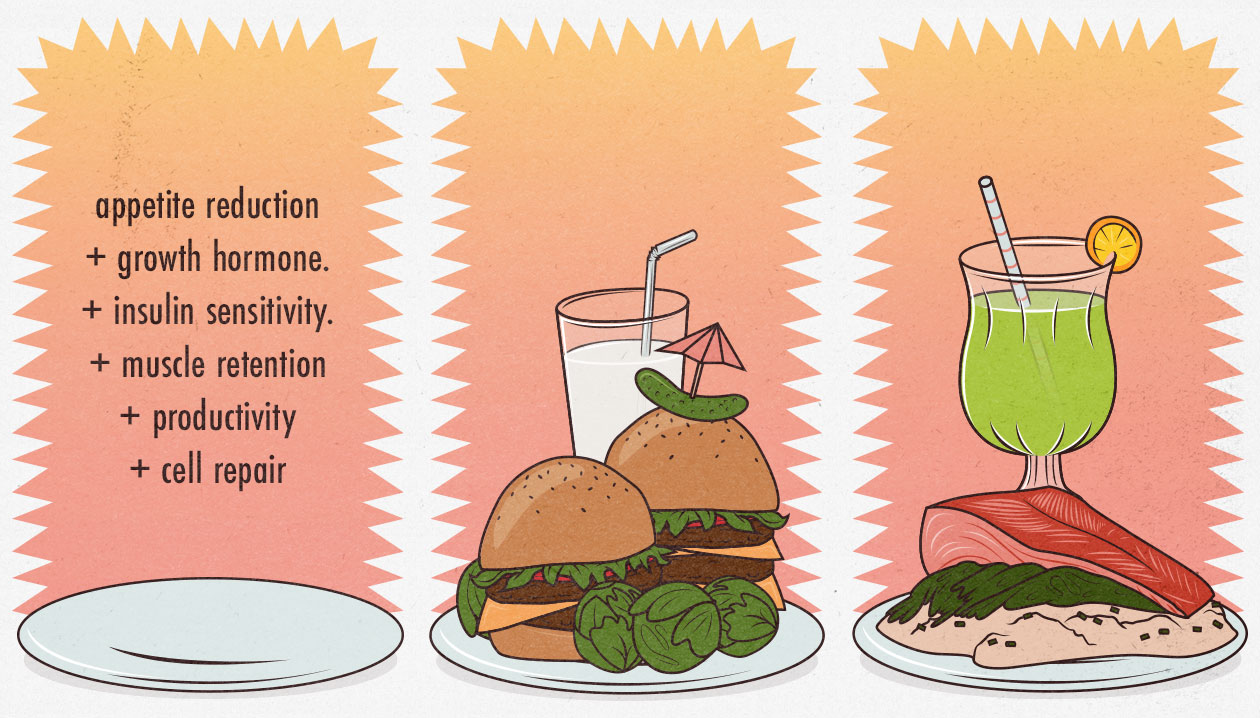
Most of these health benefits are connected to the calorie deficit. Most people find that intermittent fasting reduces their appetite, causing them to eat less food. That’s why we see these same benefits when people try other low-calorie diets, such as ketogenic diets or plant-based diets. Most people are overweight, so eating less food improves several different health markers. On the other hand, if you’re naturally thin, you probably already have all of these advantages.
Furthermore, if intermittent fasting causes a skinny guy to lose weight or prevents him from building muscle, it could be bad for his health. We don’t benefit from losing weight, we benefit from gaining muscle. A diet that interferes with that could be bad for us.
How Does Intermittent Fasting Affect Muscle Growth?
People tend to eat less food while intermittent fasting. That’s great for losing weight, but it’s awful for gaining weight, bulking up, and building muscle. That’s especially true for skinny guys who are already struggling to maintain a healthy body weight.
But let’s ignore that disadvantage for a moment. For the sake of argument, let’s say that you’re able to get into a calorie surplus while intermittent fasting. If you can eat enough calories to gain weight, can intermittent fasting allow you to bulk up more leanly? Let’s take a deeper look.
Does Intermittent Fasting Allow for Leaner Gains While Bulking?
Intermittent fasting is an extreme example of calorie cycling. To understand how intermittent fasting affects fat storage and muscle growth, first, we need to understand how regular calorie cycling affects fat storage and muscle growth.
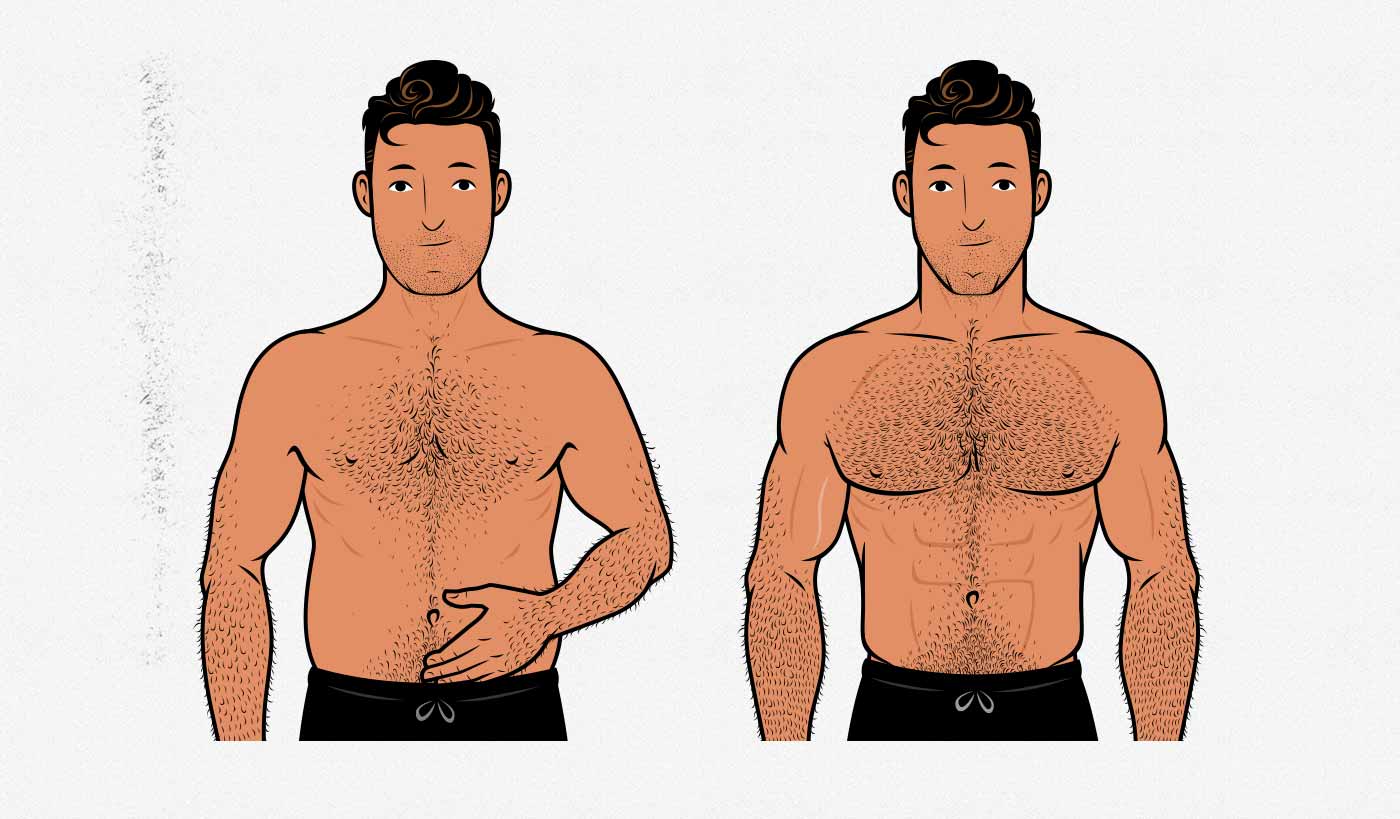
How Calorie Cycling Affects Muscle Growth
The first thing we need to do is distinguish between bulking and cutting. You can use calorie cycling to help with either goal, but the effects are rather different. When you’re bulking, you’re in a calorie surplus, and your body is totally primed for muscle growth, allowing you to build muscle quite rapidly.
While we’re bulking, we have a huge potential to build muscle. Let’s imagine it with a simplified graph like this, where the empty area under the dotted line is how much muscle your body is capable of building over time if you do everything perfectly:

As you can see, it’s not a flat line. Your body will be primed for muscle growth after a good workout, and then that muscle growth will gradually slow down as time passes, usually grinding to a halt within 48 hours.
The other thing to keep in mind is that any calories which cannot be invested in muscle growth will be stored as fat. This means that if you eat a large calorie surplus (blue line), you’re going to gain a maximal amount of muscle (red), but you’re also going to gain quite a lot of fat (yellow). This is called a “dreamer bulk,” and it looks like this:

Most people don’t want to gain that much fat, so they do what’s called a “lean bulk,” where they eat a smaller calorie surplus, like so:

By bringing down your calorie intake, you’re still gaining almost as much muscle, but you’ve slightly reduced the amount of fat that you’re gaining. However, this is a compromise. You’re not eating enough calories to fully maximize muscle growth after your bulking workouts, and you’re also gaining some extra fat because you’re not tapering off your calorie intake as your muscle growth potential slows.
You might improve your gains by lining up your calorie intake with your muscle growth potential, eating extra calories in the meals following a workout, then easing back on the calorie surplus afterwards. Maybe. It makes sense in theory, but the evidence is still fairly weak. But for the sake of argument, let’s say we get some extra lean muscle growth:

Even if you’re calorie cycling, you still want to keep yourself in a consistent calorie surplus. You still want to be steadily building muscle all day long, all week long, and all month long.
How Much Fat Gain Is Normal While Bulking?
It’s common to gain at least a little fat while bulking. That doesn’t mean you’ll get fat, just that you’ll gain fat. Even in the leanest bulking transformations, there’s usually some fat being gained. That isn’t a bad thing. You might not even notice it.
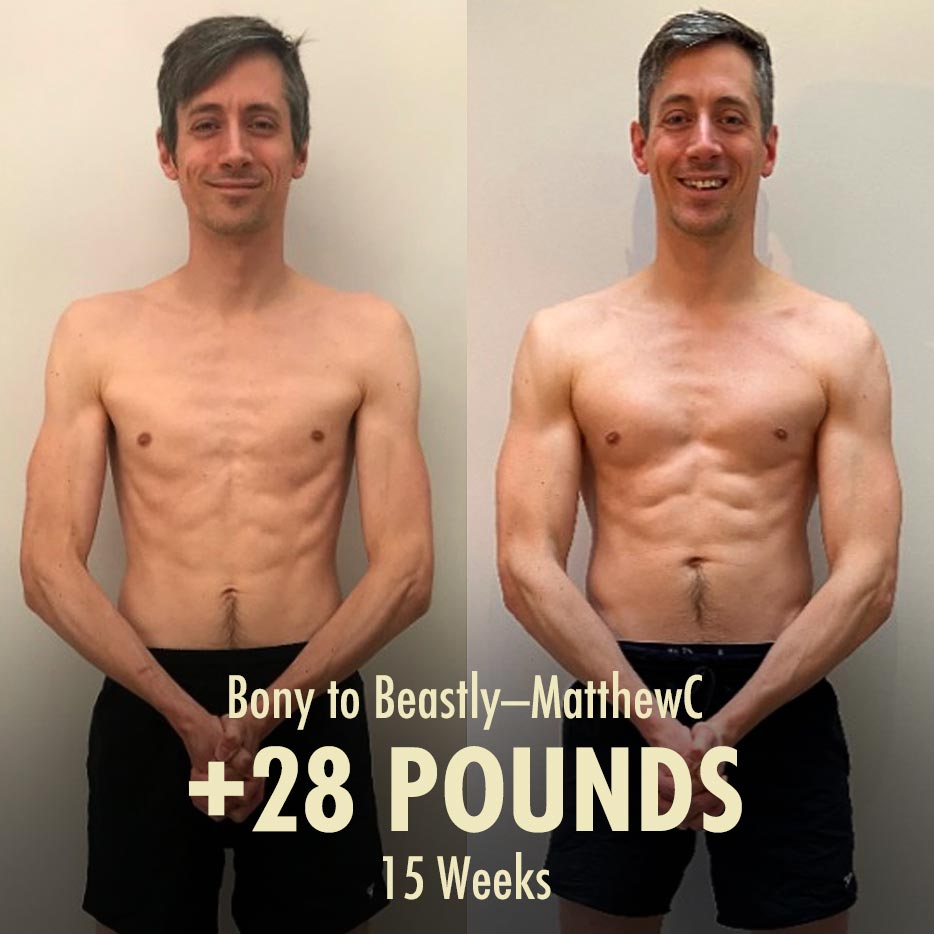
Your body-fat percentage won’t necessarily increase, either. If you start bulking at 15% body fat, then so long as you’re gaining 85% muscle and 15% fat, your body fat percentage will remain at 15% as you continue gaining weight.
Your muscles are getting bigger, too, stretching your fat thinner and giving your body more structure. Even if you gain some extra fat, you might not lose any muscle definition. The fat may even help you look buffer and fuller.
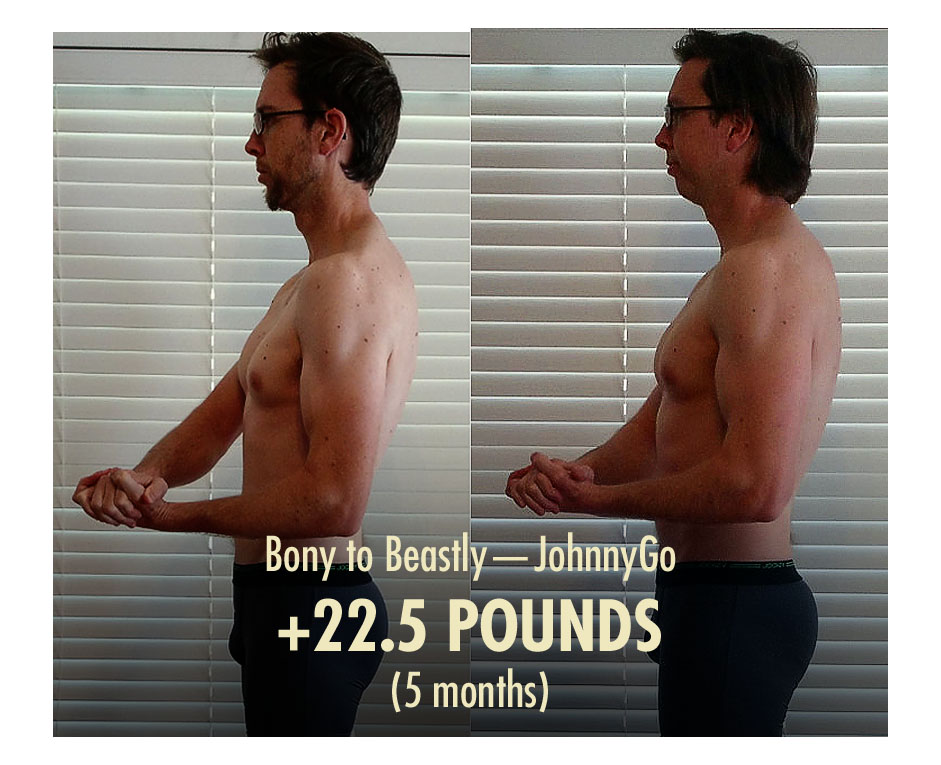
If you’re gaining too much fat, reduce your calorie intake. Bulk more slowly. That will slow your rate of weight gain, leaving fewer surplus calories to spill over into fat gain. Instead of gaining one pound per week, gain 0.5 pounds per week. You might gain muscle slightly slower, but you’ll radically reduce the fat you gain.
Intermittent Fasting is Extreme Calorie Cycling
Intermittent fasting doubles down on calorie cycling. During the feeding windows, you have more than enough calories to build muscle at full speed, and during fasting periods, you’ll dip into a calorie deficit, losing fat. This creates the misconception that you can lose fat even while you’re bulking up.
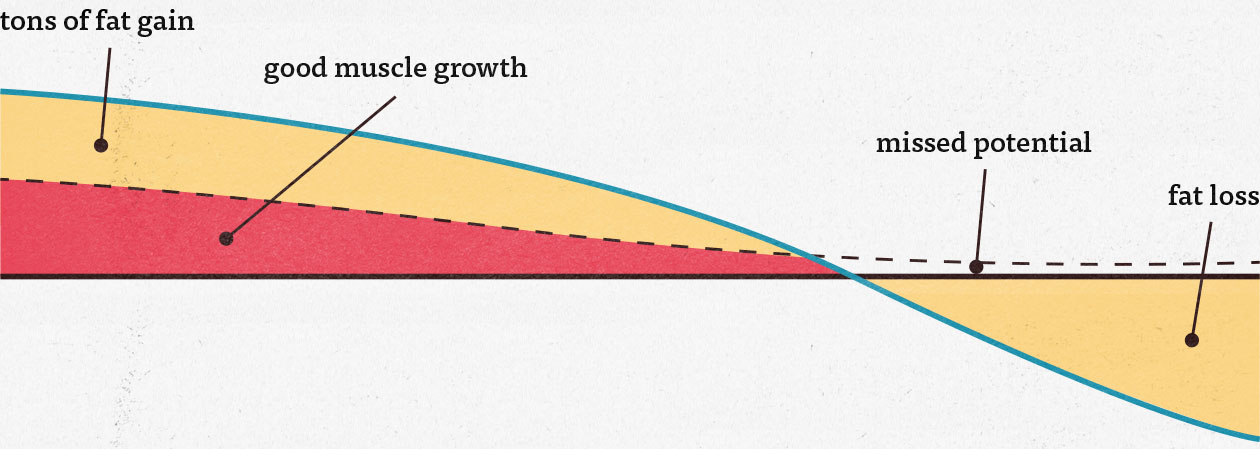
The misconception comes from the fact that in order to gain weight, you need to be in an overall calorie surplus. That means during your feeding periods, you need to make up for all the calories you missed while fasting. When you try to catch up on those calories, some will spill over into fat storage. What happens is that you lose a bit of fat while fasting, then gain even more during the feeding window.
How to Make Leaner Gains with Intermittent Fasting
If you’re bulking very slowly, gaining just a pound or two each month, then your calorie surplus doesn’t need to be very high. In this case, with such a small overall surplus, you miss out on some of the extra testosterone, nutrients, and cellular signalling, so your growth potential slows down, like so:

You won’t be able to build muscle as quickly, but you may still prefer this approach. For example, if you’re a fitness model trying to maintain yearlong leanness, and you’re happy making very slow gains, you might prefer this method.
Guys like Martin Berkhan (LeanGains) and Gregory O’Gallagher (Kinobody) do a good job of this. They might be able to get results that look something like this:

However, to say that their programs are designed for this would be to sell them short. Even the LeanGains intermittent fasting protocol is designed for fat loss and muscle maintenance, not for bulking. To quote the guy who created it, Martin Berkhan:
The “gain” in Leangains can therefore be a bit misleading, as most of my clients wants to lose fat, while retaining as much muscle as possible in the process.
Martin Berkhan, creator of LeanGains
Using Intermittent Fasting for Cutting
If you combine hypertrophy training with a calorie deficit and a good cutting diet, you can lose fat while keeping most of your muscle. Some skinny-fat beginners are even able to gain muscle while losing fat. This is true whether you use intermittent fasting or not. The advantage of intermittent fasting is that it makes it easier and arguably more enjoyable to get into a calorie deficit.
Calorie Cycling Isn’t Very Powerful
Calorie cycling pales in comparison to the quality of your workouts, the quality of your diet, your overall calorie intake, your overall protein intake, and how well you’re sleeping. In fact, the effects are so minor that they may not even exist. As promising as calorie cycling sounds in theory, the research has been fairly underwhelming. There’s no great evidence that it yields significantly leaner gains.
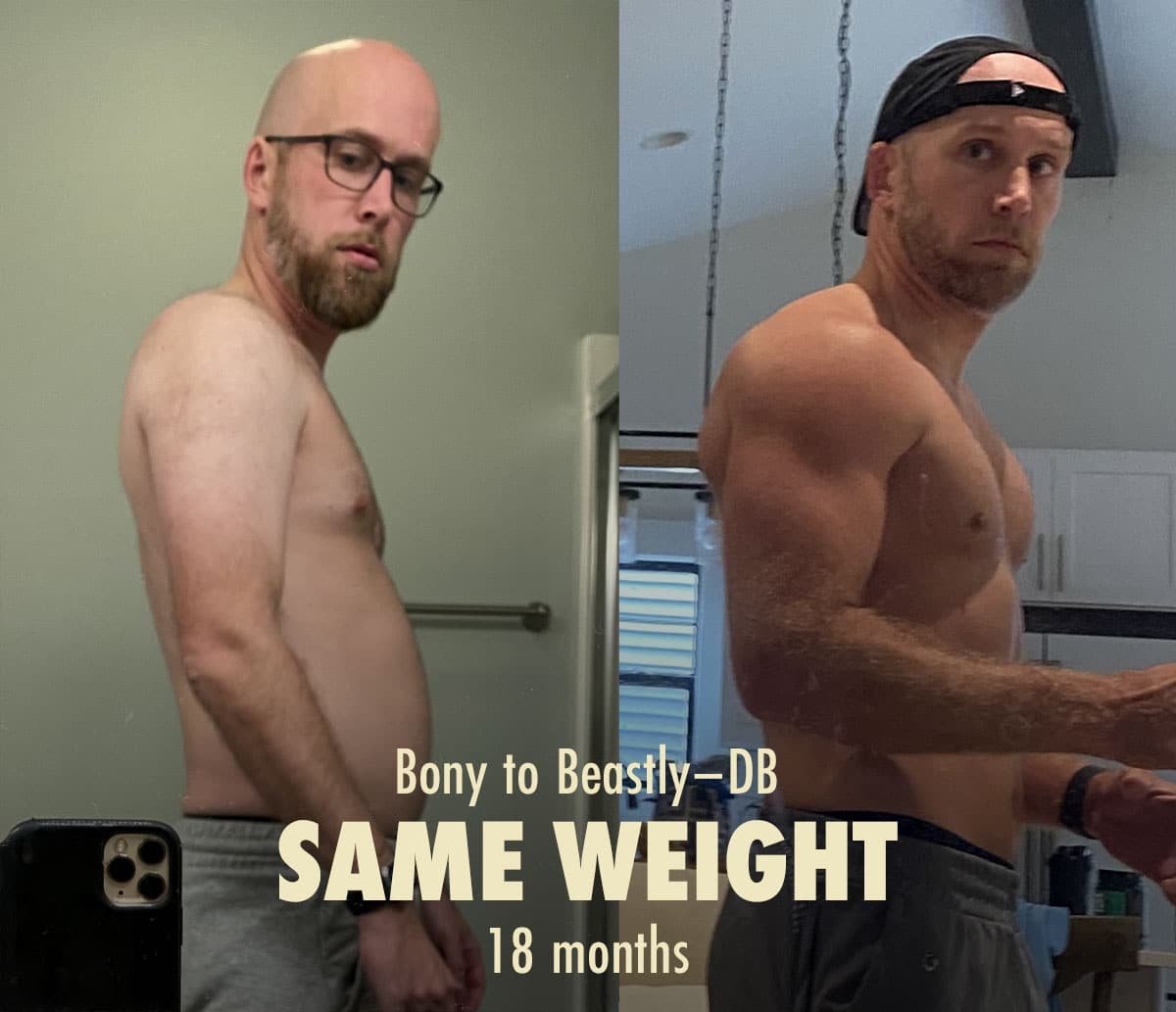
That doesn’t necessarily matter, though, because whether you cycle your calories or not, you can get great results. If you follow a good hypertrophy training program, eat a good diet, and live a healthy lifestyle, you can build an impressive amount of muscle.
Does Intermittent Fasting Allow for Leaner Muscle Growth?
Intermittent fasting doesn’t allow for leaner muscle growth while bulking. If you’re trying to build muscle quickly, you’ll likely make leaner gains by keeping yourself in a more consistent calorie surplus. That way, you can build muscle steadily throughout the day. instead of intermittent fasting. However, it won’t impact your gains that much either way (study), and the difference may not even be noticeable.
The Benefits of Eating More Frequently While Bulking
There used to be rumours about “stoking the metabolic fire.” People thought they had to eat every three hours to maintain a healthy metabolism. That was disproven, and it was more of a fat-loss concern anyway. Most of us skinny guys aren’t worried about having underactive metabolisms.
When it came to bulking, bodybuilders worried that if they spent too much time fasting, their bodies would begin to eat away at their muscle mass (catabolism). That was also disproven. Intermittent fasting is okay for maintaining muscle mass, even in a calorie deficit.
However, research has turned up some genuine advantages to eating more often:
- If you eat twice as often, your bulking meals can be half the size. This allows guys with small stomachs to comfortably eat enough food while bulking, and it prevents the feelings of lethargy after large meals. One good way to take this principle even further is by having snacks between meals.
- More testosterone. Being in a calorie surplus allows you to build more muscle by improving testosterone production, cellular signalling and providing a constant influx of nutrients. The more time you spend in this muscle-building surplus, the more muscle you will build over the course of the day.
- Less cortisol? A recent study looking at 16:8 (LeanGains) intermittent fasting found that the group who skipped breakfast not only produced less testosterone, but also more cortisol—even while eating a comparable amount of calories overall. This would lead to less muscle growth and more fat gain. However, some of these hormonal changes, while not good for building muscle, might be good for improving your longterm health. So it would seem that intermittent fasting would perhaps be better for day-to-day muscle maintenance, but worse in terms of trying to build muscle leanly.
- More muscle-protein synthesis. Researchers have proven that every time you eat a meal that’s rich in protein, you trigger muscle growth (aka muscle-protein synthesis). This means that the more often you eat (up to a maximum of 5 meals per day), the more muscle growth you can stimulate.
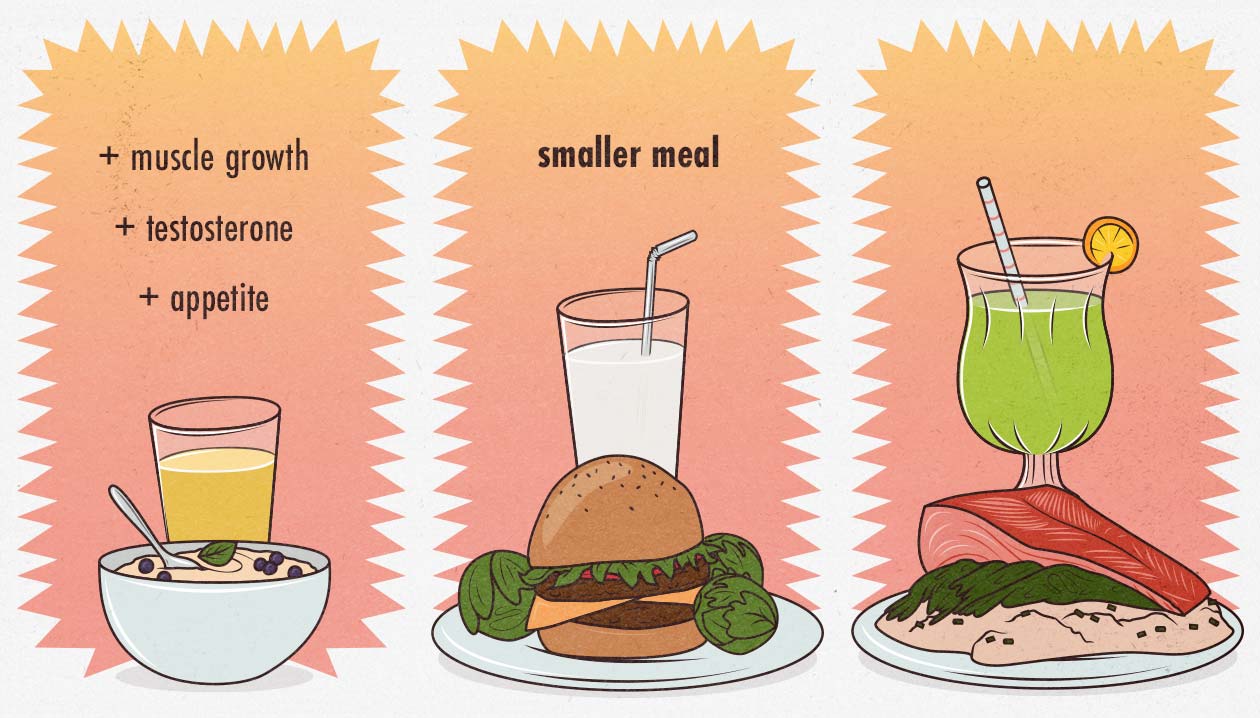
Let’s dive deeper into that fourth point, about trigging muscle-protein synthesis. If we’re intermittent fasting, are we sabotaging our bulks by missing out on opportunities to trigger muscle growth?
get our bulking recipes—smoothies, snack, & protein balls
4 free bulking recipes
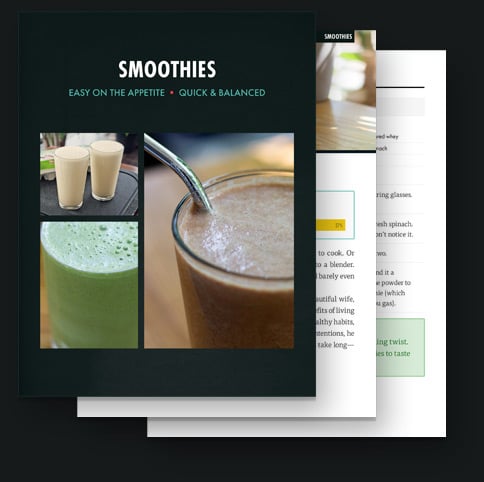
Get four bulking recipes in a downloadable PDF file. Get the full explanation, ingredient list, macros, and steps to follow.
Plus, we’ll make sure you’re on the b2B newsletter, and send you all of our best muscle-building content.
Stimulating Muscle-Protein Synthesis
Dr. Layne Norton’s research is the most relevant here (study, study, study). We’ve already shown how lifting weights triggers a period of muscle growth that lasts for around 48 hours. But to take advantage of that opportunity, you also need to be on point with your diet. Norton found that when we eat a meal with enough protein in it, it triggers a surge of muscle growth that gradually slows down over the course of around six hours, like so:

This isn’t just “potential” muscle growth, this is your body actually constructing muscle. That means that if you eat three meals per day, you’d be having muscle growth spurts that look something like this:

Already we can see that skipping a meal is a missed opportunity for muscle growth:

This Nortonian model of muscle growth brings up some questions. First of all, if you miss a muscle gain opportunity, can you make up for it later by eating a meal that has extra protein in it? For example, what if we could do something like this:

Unfortunately, catching up is not possible. Norton’s research has proven that muscle growth is maximally stimulated with around 40 grams of protein. If you have more than 40 grams of protein in a meal, no additional muscle growth is triggered. So if you skip a meal, or eat a meal with too little protein in it, there’s no way to make up for it by eating more protein in the next meal. This means that it’s better to spread your protein intake out over the course of the day.
Protein Distribution Doesn’t Need to Be Perfect
It’s fine to eat more than forty grams of protein per meal. If you have more than 40 grams in a meal, that’s perfectly fine, and that might be needed in order to hit your daily macro goals, but it won’t trigger extra muscle-protein synthesis.
Twenty grams of protein still stimulates a lot of muscle growth. While eating 40 grams of protein per meal will get you the absolute ideal amount of muscle growth (100%), eating just 20 grams of protein will get you most of the results (80%). If you don’t hit 40 grams of protein in every meal, that’s fine, just make sure to get at least 20 grams.
For example, it’s common to have more protein with dinner than with breakfast, so a common way to distribute your protein over the course of the day might look something like this:

Your breakfast will still allow you to build muscle just fine, and the larger amount of protein with dinner will still be fully digested. It’s not perfectly ideal, but it’s pretty good. If you wanted to 100% maximize your muscle growth, though, you’d move 20 grams of protein from dinner to breakfast, giving you at least 40 grams in each meal.
How Often Can We Stimulate Muscle-Protein Synthesis?
This raises another question. How often can we stimulate muscle protein synthesis? Could we eat protein all day long, perpetually maintaining peak muscle growth conditions? What about something like this?

Layne Norton tested this idea and discovered that we can only trigger muscle growth once every four hours or so. If we eat meals more frequently than that, again, the protein will contribute towards our daily macros, but the meals won’t stimulate extra growth via muscle-protein synthesis.
This leaves us with an ideal meal schedule that looks something like this:

How controversial is this research? Could it be wrong? While there are still some questions about this theory, most of them are finer details, not issues with what we’ve discussed above. One of those finer details is that these spurts of muscle growth seem linked to one specific component of protein (leucine), not our overall protein intake. Dr Stuart McGill’s research has shown that some protein sources have more leucine than others, so it’s not quite as simple as just making sure to eat 40 grams of protein (study). For example, you can get maximal muscle growth with just 27 grams of whey protein, whereas you might need more like 50 grams of rice protein in order to get the same effect.
However, Norton’s overall research isn’t controversial. In fact, it’s the dominant theory among the top researchers in the field, including both Dr Eric Helms and Dr Brad Schoenfeld. To quote Schoenfeld:
The anabolic effects of a meal last a maximum of 6 hours or so. Thus, consumption of at least 3 meals spaced out every 5 to 6 hours would seem to be optimal for keeping protein synthesis continually elevated and thus maximizing muscle protein accretion. This hypothesis needs further investigation in a controlled long-term study.
Now, one discrepancy to note is that Norton recommends eating every four hours, whereas Schoenfeld recommends eating every 5–6 hours. While their recommendations are slightly different, their understanding of the research is not. Norton is simply erring on the side of eating more often, whereas Schoenfeld is erring on the side of eating a little bit less often. They’re both giving advice based on the same understanding of the science.
How Do Lifting and Protein Distribution Fit Together?
Both lifting and consuming protein increase muscle protein synthesis. We’re talking about the same phenomenon in both cases. After a good workout, muscle-protein synthesis will shoot up and then slowly decrease over the course of a few days. Eating a meal that’s rich in protein has a similar but milder effect that lasts for just a few hours.
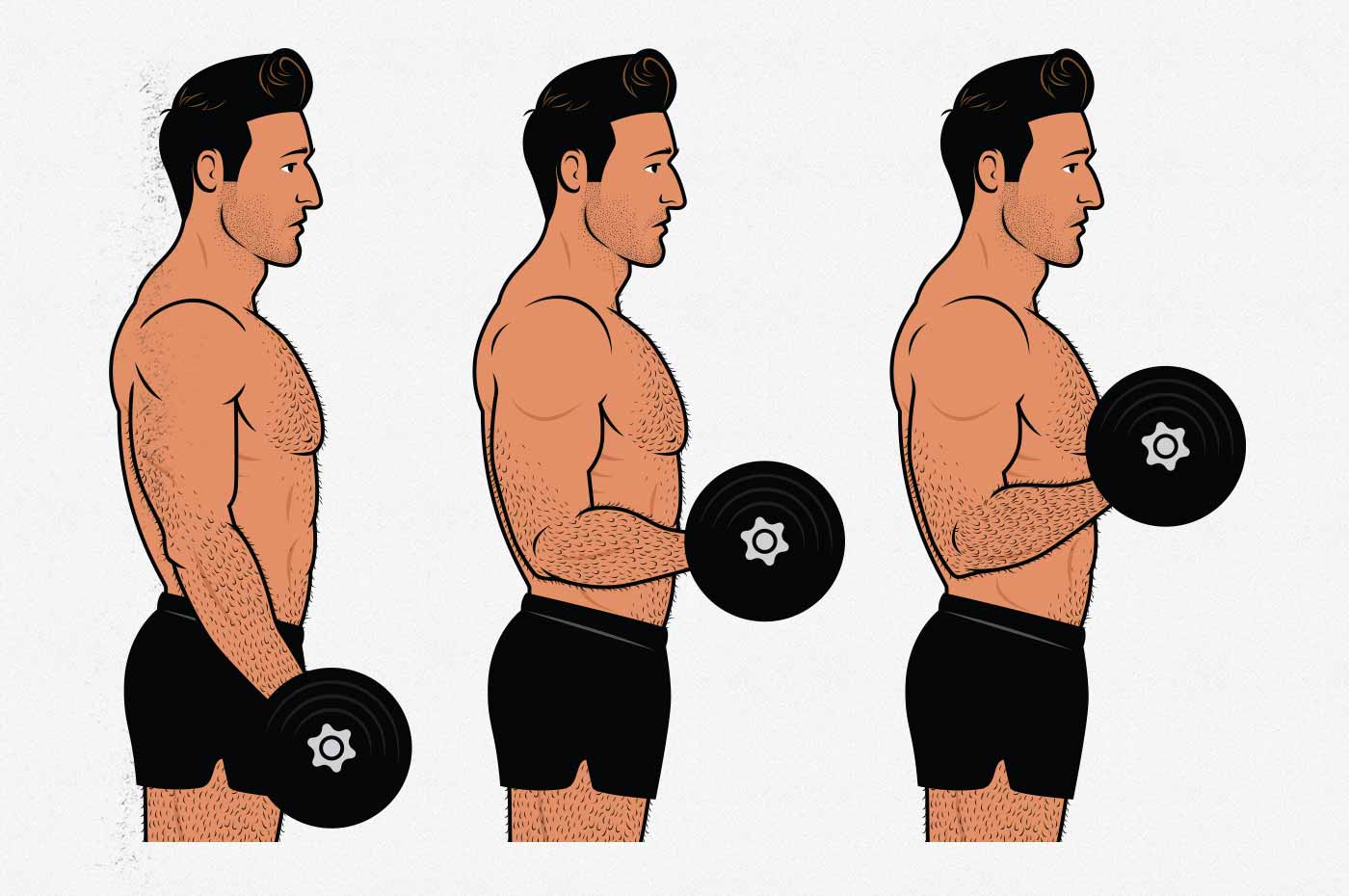
If you consider that you’re going to have extra growth potential immediately after training, does that mean you should be eating extra protein post-workout? Yes. Some recent research is showing that after a hearty full-body workout, there’s a benefit to having some extra protein.
So you might consider your ideal workout day to look something like this:

This is a pretty classic bodybuilding diet, where you eat 4–5 meals per day and have an especially big post-workout meal. Fairly simple, and fairly ideal.
Should You Eat 4–5 Meals Per Day While Bulking?
Does this mean you should be eating 4–5 meals per day? Yes, but they don’t all need to be huge meals. You can trigger muscle growth just as easily with snacks, such as a bit of greek yogurt, a protein bar, a protein shake, or cottage cheese. These snacks may make your overall diet easier. They’ll allow you to have a smaller breakfast, lunch, and dinner. If you’re a skinny guy with a small stomach (like me), that can be a great advantage.
Don’t worry if you can only eat three meals per day. Just have breakfast early, have dinner late, and make sure your meals have at least twenty grams of protein in them. That meal schedule might not be perfectly optimal, but you’ll still get great bulking results, and you probably won’t notice the difference.
What About Growth Hormone?
One of the main purported benefits of intermittent fasting is increased growth hormone production. If we eat steadily throughout the day, we miss out on that extra growth hormone. Should eat more often to get more muscle-protein synthesis, or should we fast to get more growth hormone?
Let’s compare the two overall approaches.
Intermittent Fasting vs a Traditional Bulking Diet
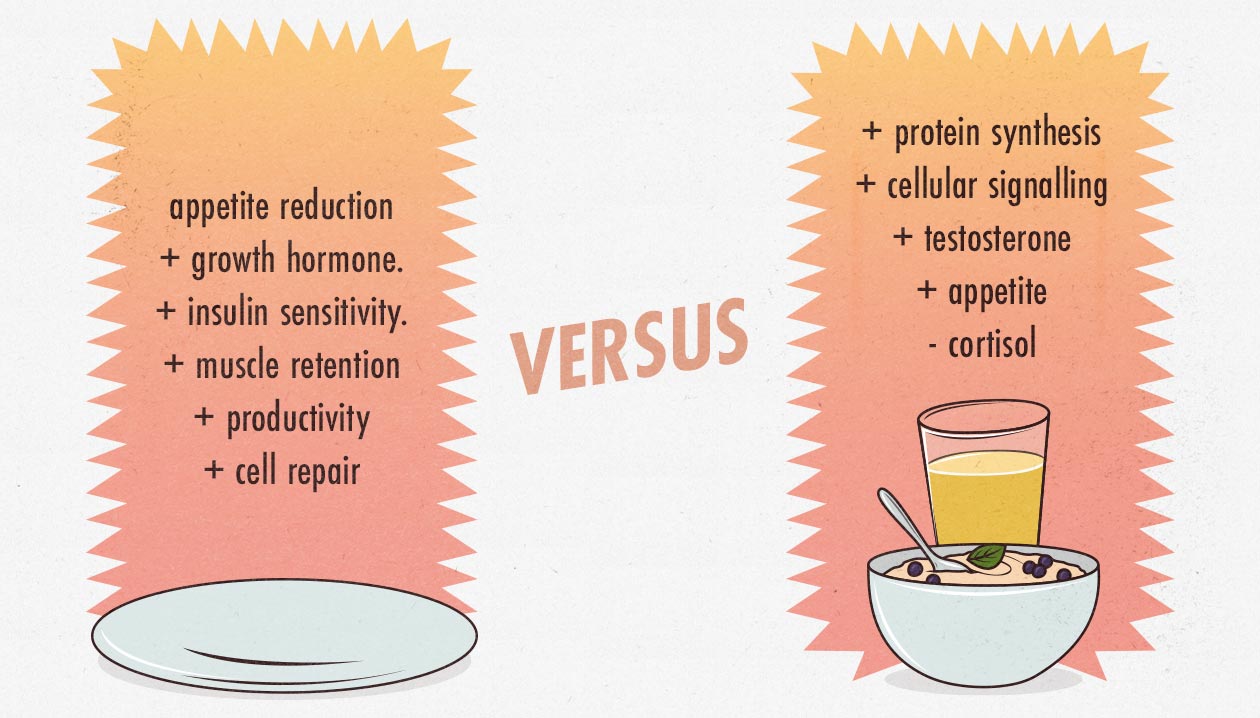
We’ve looked at the muscle-building advantages of intermittent fasting, with the main advantage being greater growth hormone production. We’ve also looked at the muscle-building advantages of eating more frequently, with the main advantage being that you’d stimulate more muscle growth more often.
Which advantage is greater? Researchers have compared different meal schedules and concluded that having several meals spread out over the course of the day builds more muscle than intermittent fasting (study). In fact, a new study found that when overall protein and macronutrient consumption were identical, having breakfast increased muscle growth by 37%.

Eating 3–6 meals per day is ideal while bulking, especially if you’re skinny. However, once again, the difference is going to be very small. So small that it may not even be noticeable. In fact, some studies comparing intermittent fasting against a more normal meal schedule found identical amounts of muscle growth (study).
Eating more frequently may result in leaner gains. Since the amount of calories you eat determines the amount of weight you gain, and since intermittent fasting reduces muscle gain, this means that while the overall amount of weight you gain in either situation will be the same, you’d theoretically gain less muscle and more fat with intermittent fasting.
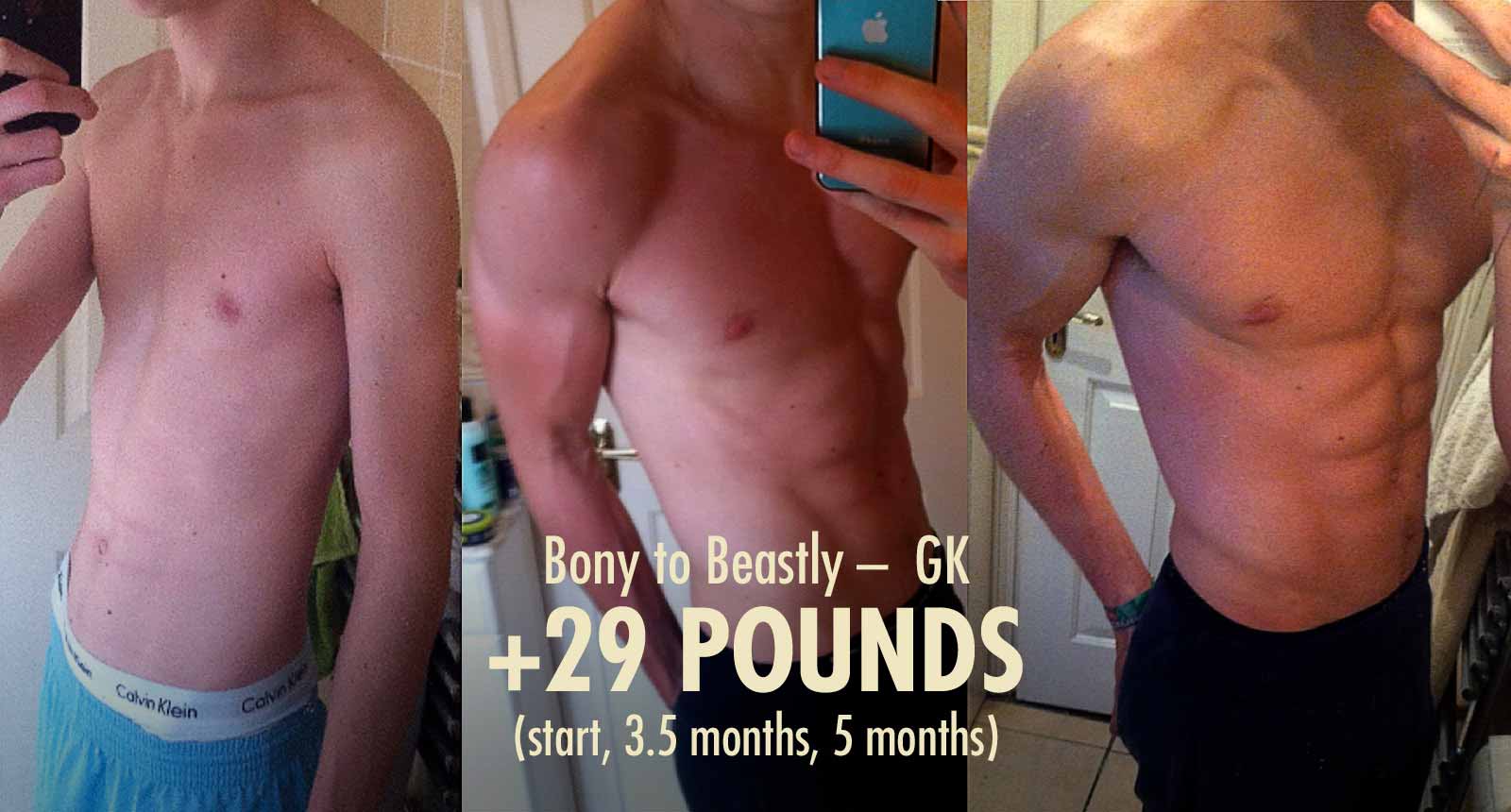
Eating more frequently makes it much easier to eat enough calories to bulk up. And keep in mind that if you have a smaller stomach or faster metabolism, eating more frequently is absolutely essential while bulking. Your stomach simply won’t be able to handle the massive meals of an intermittent fasting bulking protocol. (We’ve had members attempt this and wind up giving themselves acid reflux.)
The Best Types of Intermittent Fasting for Muscle Gain
By now, it should be clear that we don’t consider intermittent fasting to be ideal for bulking. However, nutrient timing isn’t that big of a factor when it comes to muscle growth. At most, skipping breakfast could reduce our muscle growth by around 37% (study). That might sound like a lot, but over the course of the twelve-week study, that’s a difference between gaining four pounds of lean mass versus gaining 5.5 pounds. It clearly shows that if our workouts, diet, protein intake, and sleep habits are on point, we can make good gains while eating anywhere from 2–7 meals per day.
This means that intermittent fasting is still a valid option, even while bulking. Furthermore, some intermittent fasting diets take some of our criticisms into consideration.
The BCAA Fast
The main disadvantage of fasting while bulking is the lack of muscle protein synthesis. However, what if it were possible to stimulate muscle protein synthesis while fasting? This would allow you to get the best of both worlds, right?
Supplementing with leucine or branched-chain amino acids (BCAAs) sort of allows you to do that. They contain enough of the amino acid leucine to trigger muscle-protein synthesis, but they contain so few calories that Martin Berkhan still considers it fasting. The downside is that since you’d still be in a calorie deficit, there wouldn’t really be any muscle growth going on. (The strategy works better while cutting, as the BCAAs prevent muscle loss and improve workout performance.)
24-Hour Fasts
There are also types of intermittent fasting where you only fast for one 24-hour period each week. The most famous version of that is Brad Pilon’s Eat, Stop, Eat approach, and that’s also the approach Dr. John Berardi used when testing out an extreme bulking plan on the fitness blogger Nate Green (Bigger, Smaller, Bigger).
There are three benefits to doing 24-hour fasts:
- They give your digestive system a break from overeating. This might not give you any physiological benefit, but if you’re sick of being full, it can be psychologically pleasant.
- You get to burn a little bit of fat right in the middle of your bulk. Mind you, you may also lose some muscle.
- You’ll still be growing at full speed 86% of the time. That’s a big improvement compared to 16:8 fasting, where you’d only be growing at full speed for 67% of the time.
There are also three downsides to 24-hour fasts, though:
- You won’t be gaining muscle on the day you’re fasting, reducing your overall rate of muscle growth.
- Spending 24 hours without eating can be extremely unpleasant for some people.
- Going to bed without eating enough food that day can make it hard to get a good night’s rest. You may even bolt awake in the middle of the night, pumped full of cortisol, ready to hunt.
The Skinny Guy’s Muscle-Building “Fast”
There are two significant advantages to intermittent fasting while gaining muscle:
- Skipping breakfast is pleasant and productive. Most skinny guys wake up without much of an appetite, making breakfast more of a chore than a treat. Moreover, eating a big breakfast can use up our morning energy on digestion, especially if we have weaker digestive systems (and many of us do).
- Our digestive system gets a break from overfeeding. Bulking diets can be brutal on skinny guys. There are just so many damn calories that it can feel like a relentless assault on our stomachs and energy levels. Taking a day off each week where we don’t eat any calories can be a welcome break.
However, there are also two major downsides to intermittent fasting:
- Less muscle growth, more fat. When you’re fasting, your muscles aren’t growing. This will not only slow down your muscle gains, you’ll also gain more fat.
- Intermittent fasting makes eating enough to gain weight way harder. It’s hard enough to eat a bulking diet when you’re eating 3–5 times per day. Cram those calories into a couple of meals over the course of a few hours, and it becomes downright brutal. Who wants to eat a 1,500-calorie lunch? Lots of people, sure, but I’d rather stick a fork in my eye.
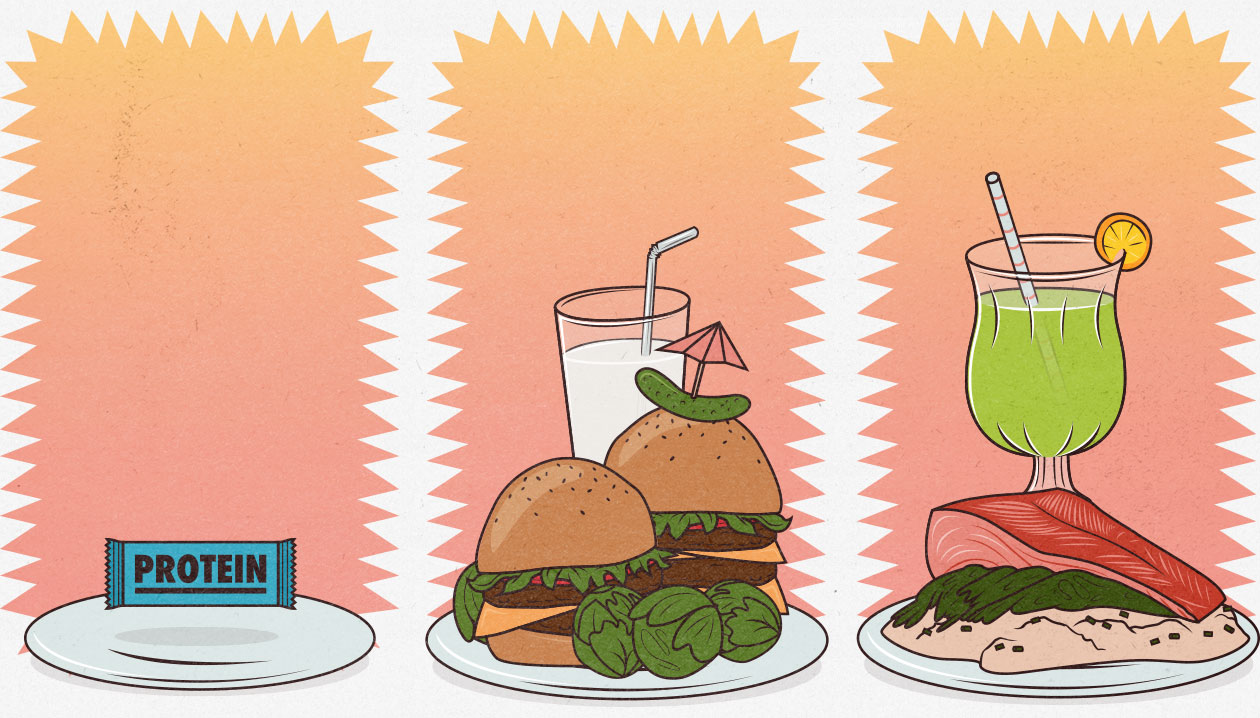
So, how can we min-max our muscle-building results based on all of this research? I have two intermittent fasting protocols you might want to experiment with. Keep in mind that you’re always free to follow a traditional bulking diet, eating 3–5 regular meals per day. But if you find yourself wanting to experiment with intermittent fasting for muscle gain, here’s what I recommend instead:
The Mini-Meal Reverse Cheat Day
24-hour fasts allow your digestive system to take a break, and it might give you a chance to lose a little bit of fat right in the middle of your bulk. That’s great, but we can accomplish all of that without any fasting whatsoever.

Instead of fasting once per week, we recommend having a “cheat day.” But instead of doing the fat-person cheat day, where you eat extra food, we recommend doing the skinny guy’s cheat day, where you eat less food. You can still eat several times per day, just keep your protein intake high and your calorie intake low. Your digestive system will love the break, and you’ll lose some fat. (This is how Jared gained 33 pounds in three months, as shown above.)
You’d have a meal schedule something like this:
Monday: full-body workout, eat big
Tuesday: rest, eat big
Wednesday: full-body workout, eat big
Thursday: rest, eat big
Friday: fully-body workout, eat big
Saturday: rest, eat big
Sunday: take a break from eating big
The Light Breakfast
Skipping breakfast increases morning productivity, but you miss out on an opportunity to stimulate muscle growth. One solution is to have a protein-rich breakfast that’s smaller and lower in calories.

This light breakfast could be a protein shake and some fruit, a protein bar and a latte, or even just a smoothie. All of those will be quite easy to digest, they aren’t very filling, and they can contain at least 20 grams of protein. The meal will be light enough that you’ll still be productive, you won’t fall too far behind on calories, and you’ll kick-start some morning muscle growth.
These half-fasts are what Dr. Layne Norton recommends to bulkers who are curious about intermittent fasting:
If you want some of the benefits from intermittent fasting but want to optimize muscle mass, I would advise a different type of fast. Rather than cutting out all calories, simply restrict carbs and fats during your fasting window, but continue to evenly distribute your protein intake throughout the day.
Take this approach, and you are still going to get a large volume of food in the feeding period and spend a large portion of the day in a low-insulin fat-burning state, but you’ll be able to distribute protein in such a way that is better for muscle growth.
Layne Norton, PhD
This is what we recommend to our members, and this is how I managed to gain 55 pounds over the course of a couple of years:
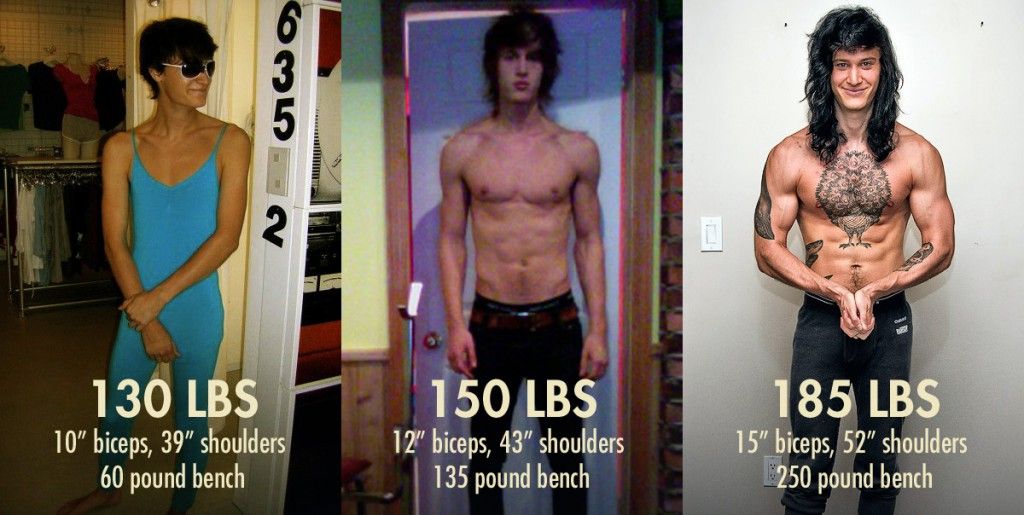
2020 Study on Intermittent Fasting for Muscle Gain
A new study by Tinsley et al. looked into the results of using intermittent fasting for muscle gain. They compared muscle growth between different groups of women, some of whom were eating steadily throughout the day, others who were intermittent fasting (using a 16:8 protocol). What’s interesting is that these women were bulking on a modest calorie surplus of around 200 extra calories per day, and there were no differences in muscle growth between the groups. This seems to show that, at least with slower rates of weight gain, intermittent fasting doesn’t reduce our ability to build muscle while bulking.
I reached out to Eric Trexler, PhD, for his thoughts on what to make of this for guys doing a bonafide bulk (eating in a larger calorie surplus and gaining closer to a pound per week). He told me the following:
It’s certainly possible that results could’ve been different if they pushed for a particularly rapid rate of muscle gain, but we can’t be sure. There are certainly some downsides of IF, and I don’t see a ton of utility when it comes to bulking. The primary benefit seems to be satiety management when caloric intake is low. I can’t imagine intentionally nudging somebody toward time-restricted feeding unless they were struggling with hunger, or simply couldn’t accommodate more meals into their eating schedule due to timing/logistics.
As noted in the [Monthly Applications in Strength Sports] article, it is interesting that interventions don’t seem to show a detrimental effect on hypertrophy. Based on the research to date, I’m left to assume that the robust effect of resistance training on 24-hr protein synthesis is essentially “washing out” the small benefit of more carefully scheduled protein feedings for initiating frequent spikes in muscle protein synthesis. However, I think the “default approach” for bulking would still be shooting for 3-5 meals spaced throughout the day.
And as more research comes out on the topic, I feel less and less confident telling someone that they’re making a huge mistake by adopting a time-restricted feeding window, from a muscle retention/hypertrophy perspective.
As far as my own take on this, I think I might need to adjust my graphs to show a larger boost in muscle-protein synthesis from lifting weights and a smaller boost in muscle growth from individual meals. I think that’s going to give us a clearer visual representation of how intermittent fasting affects muscle growth while bulking.
I’ll keep my eye on the research to see what else happens. Intermittent fasting remains popular, so I think we’re going to have plenty of new studies coming out, hopefully with some of them conducted on men who are bulking up more quickly.
2020 Study on Protein Distribution for Muscle Growth
Yasuda and colleagues looked at the effects of protein distribution on muscle growth (study). What’s nice about this study is that they measured how much lean mass was gained, giving us an idea of what the differences are likely to add up to in the real world.
In this study, the participants were put on a twelve-week weight training program. Half the participants were given a breakfast that was extremely low in protein, whereas the other half were given a normal breakfast containing an average amount of protein. Both groups ate the same amount of protein overall, and both diets had the same macronutrients. The only difference was the schedule.
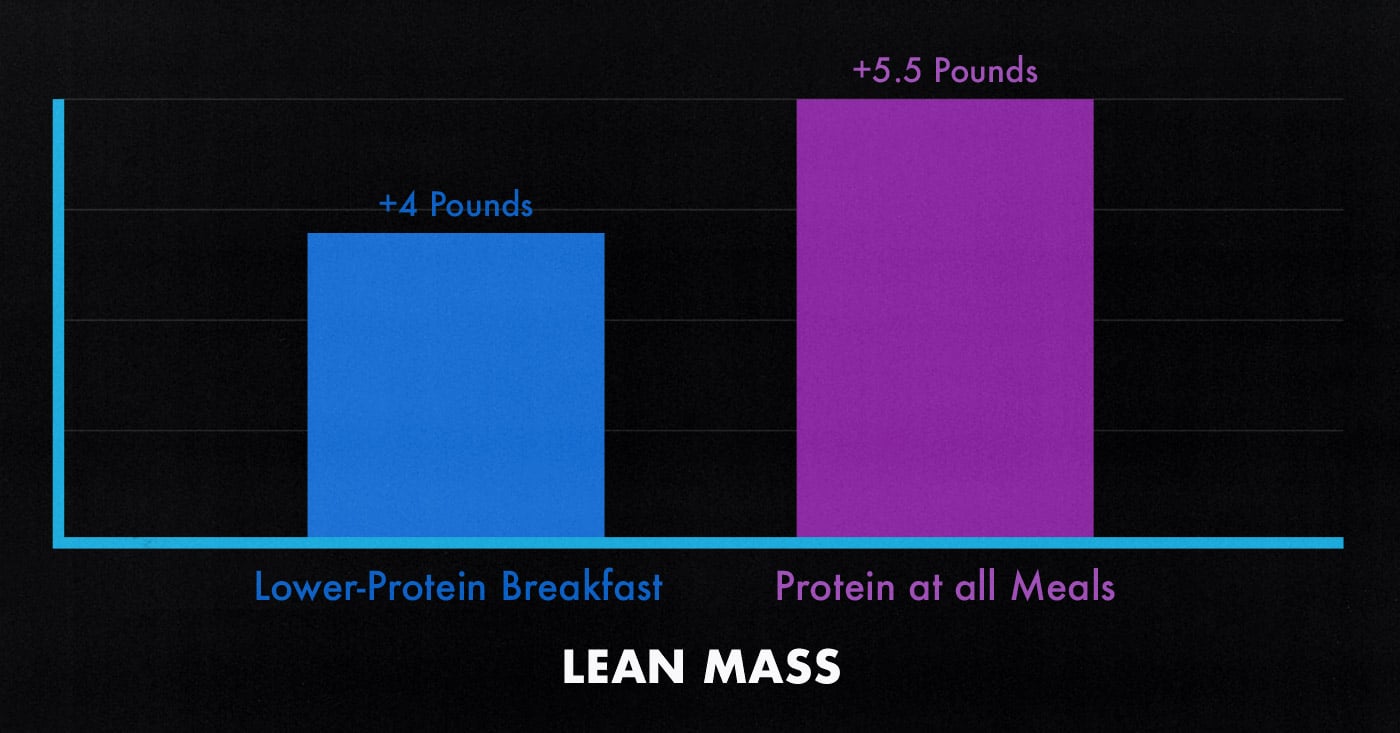
What we see is that eating protein in the morning increased muscle growth by around 37%. It also yielded larger increases in strength.
This lines up with previous research and expert recommendations fairly well, giving us more confidence that intermittent fasting isn’t ideal for building muscle. It can work, but this study suggests that we’d be able to gain muscle 37% faster simply by eating a protein-rich breakfast.
2022 Study on Intermittent Fasting and Muscle Growth
Parr and colleagues assigned eighteen men to either an intermittent fasting group or a control group (study). The intermittent fasting group ate their meals at 10AM, 2PM, and 6PM, giving them an eight-hour feeding window. The control group ate the same quantity and quality of food, but they ate their meals at 8AM, 2PM, and 8PM, giving them a twelve-hour feeding window.
Both groups lost a little bit of weight. The intermittent fasting group lost more muscle and less fat. The control group lost more fat and less muscle. This study hints that a regular eating schedule might be better for our body composition, but since both groups were in a calorie deficit, it doesn’t directly tell us anything new about intermittent fasting while bulking.
A 2023 Meta on Intermittent Fasting and Appetite
Up until now, I’ve thought intermittent fasting reduced appetite or at least made it harder to eat as many calories. However, a new meta-analysis by Elseworth and colleagues found it had no effect on appetite or weight loss. Since this meta-analysis includes all the studies that came before it, it’s the strongest evidence we have.
This might suggest that intermittent fasting could be viable while bulking, but I’m still skeptical. One of the biggest challenges with bulking is having to struggle through overly large meals, feeling hot and lethargic afterwards, and potentially dealing with issues like acid reflux. When huge meals come later in the day, they can also interfere with sleep. That leads me to believe that intermittent fasting would make it harder to bulk, especially if you’re already pushing against the limits of a too-small stomach.
2024 Study on Protein Distribution
Jorn Trommelen led a new study on protein timing, finding that 100 grams of protein per meal stimulated more muscle-protein synthesis than 25 grams per meal. This sounds like it challenges older research. It seems to make a case for the viability of intermittent fasting (and it might).
However, we already knew that 25 grams of protein isn’t enough to maximize muscle-protein synthesis. You’d expect more protein synthesis with 40 grams. So it makes sense that 100 grams would stimulate more muscle-protein synthesis than 25 grams.
Still, this new study suggests you might be able to maximize muscle growth with fewer meals, provided you still eat enough protein overall. That’s a point in favour of intermittent fasting.
2024 Meta-Analysis on Intermittent Fasting for Fat Loss
A big new meta-analysis by Wan and colleagues found that intermittent fasting tends to cause weight loss. No big surprise there, given that previous meta-analyses found the same thing (meta, meta).
Overall, we’re seeing that intermittent fasting can be a good way to get into a calorie deficit. Some studies show that fasting helps to preserve muscle while losing weight. Others show that fasting causes people to lose more muscle. The results aren’t consistent, and the effect isn’t very large either way.
2025 Update: Intermittent Fasting and Hair Loss
A couple of new studies have found that intermittent fasting may cause hair loss and balding. The first study was in mice, but the same thing was then found in both men and women. It seems that skipping meals might damage hair follicle stem cells. I wrote a full article about it here.
Note that this isn’t male pattern balding. Rather, it’s that some of the participants—male and female—wound up with damaged hair follicles all over their heads.
This research is still fairly young. I wouldn’t read too much into it yet. But if you try intermittent fasting, and if you notice that your hair isn’t as thick and healthy as it used to be, then that may be why. Maybe.
Summary
Overall, intermittent fasting seems to slightly impair muscle growth while making it harder to get into a calorie surplus, making it harder to bulk up.
Most of the rumours about intermittent fasting are false. Fasting doesn’t cause instant muscle loss, skipping breakfast doesn’t harm our metabolisms, and we can digest eighty or more grams of protein per meal without issue. Most of all, many people find that fasting makes it easier to get into a calorie deficit, allowing them to lose weight more easily. It’s popular for a reason.
But intermittent fasting probably isn’t ideal for gaining muscle. Not only does it seem to slightly slow muscle growth, but it also makes it harder to gain weight and harder to keep those gains lean. Plus, the supposed benefits, such as increased growth hormone production, don’t seem to have any impact on muscle growth (study). So, although intermittent fasting doesn’t make it impossible to gain muscle, it might make it harder and slower.
If you want to gain muscle as fast and as leanly as possible, it’s better to eat 3–7 meals spread relatively evenly through the day, as bodybuilders have been doing for the past hundred years. It’s not the only way to build muscle, but it makes for a good default, especially if you’re a skinny guy who has a hard time gaining weight.

Alright, that’s it for now. If you want more muscle-building information, we have a free muscle-building newsletter. If you want a full workout and diet program, including a 5-month customizable full-body workout routine, a diet guide, a recipe book, and online coaching, check out our Bony to Beastly Program. Or, if you want a customizable intermediate muscle-building program, check out our Outlift Program.

